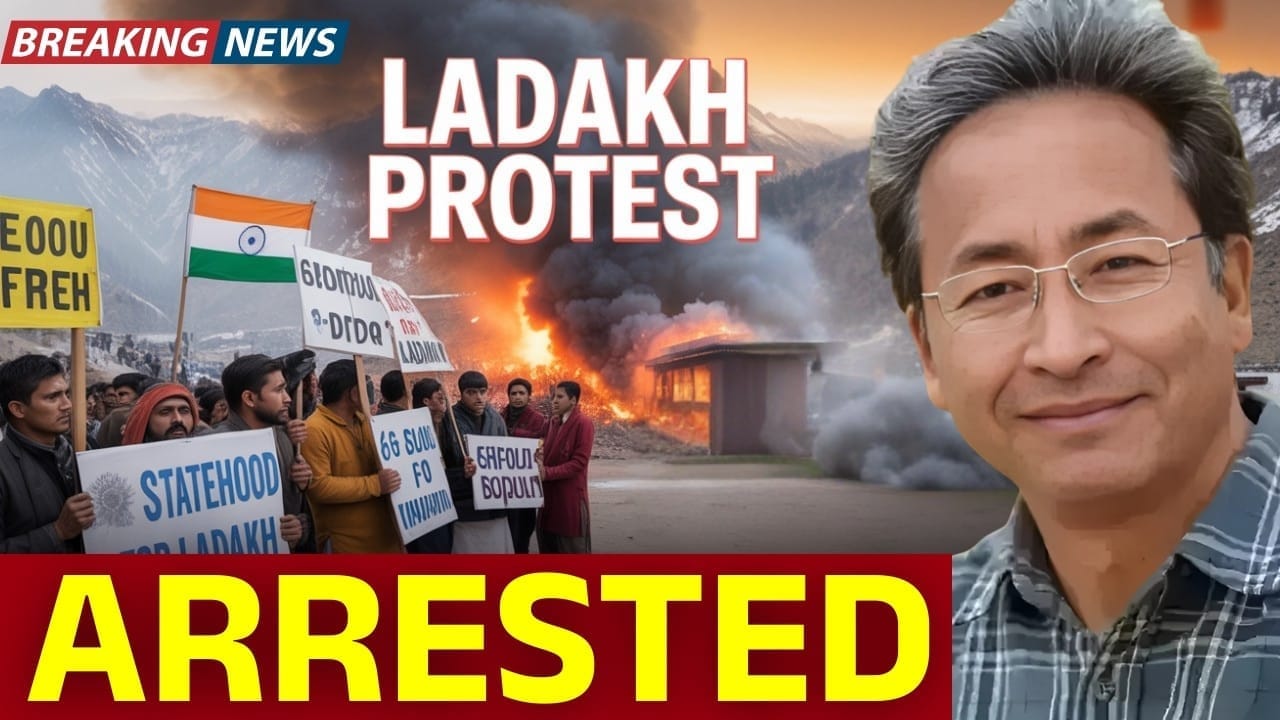Sonam Wangchuk Arrest Amid Violent Ladakh Protests

The arrest of Sonam Wangchuk in Ladakh has created shockwaves across India. Known as a climate activist, education reformer, and voice for Ladakh’s people, Wangchuk was recently arrested by the Ladakh Police for what officials call a “provocative speech.” This development comes at a time when the region is already facing unrest due to demands for statehood and inclusion under the 6th Schedule of the Constitution.
This blog aims to explain what exactly happened, why it happened, and what the larger implications are for Ladakh and India.
What Happened?
On the afternoon of September 26, 2025, around 2:30 PM, Sonam Wangchuk was taken into custody by the Ladakh Police. The arrest was supervised by senior police officials and members of intelligence agencies.
According to reports, Wangchuk’s recent speeches were under government scanner as they allegedly encouraged youth to protest aggressively, which later turned violent. Authorities claim that his statements were responsible for spreading unrest in the region.
Earlier, his NGO’s FCRA (Foreign Contribution Regulation Act) license was also suspended, signaling growing tension between him and the administration.
Why Was He Arrested?
The official reason behind the arrest is “provocative speech.” Authorities argue that:
His words allegedly provoked youth into violent protests.
Several civilians were injured in recent clashes linked to these protests.
Law and order was under threat in the sensitive border region of Ladakh.
From the government’s perspective, keeping peace in Ladakh is not just about local issues – it is about national security. With China and Pakistan both active around Ladakh’s borders, any internal instability is seen as dangerous.
The People’s Demands
To understand this issue fully, we must look at what the people of Ladakh are demanding:
Statehood for Ladakh – After the abrogation of Article 370 in 2019, Ladakh was turned into a Union Territory without a legislative assembly. Many locals feel they lack political power and representation.
6th Schedule Protection – This would provide constitutional safeguards for land, culture, and resources, similar to protections given to tribal areas in the Northeast.
Land and Job Security – Locals fear outsiders will take over their land and jobs without special safeguards.
Sonam Wangchuk became a leading voice for these demands, which gave him huge local support but also put him in direct conflict with the administration.
Is This Suppression or Security?
This is where the debate begins.
Supporters of Wangchuk believe that the arrest is an attempt to silence a democratic voice fighting for Ladakh’s rights. They argue that protest is a fundamental right, and instead of listening, the government is using force.
The Administration’s View is that peace and stability must come first in Ladakh. They cannot allow speeches or protests that risk turning violent, especially in such a strategically sensitive region.
Both sides have some truth. The challenge lies in finding a balance between security and democracy.
The Larger Implications
The arrest of Sonam Wangchuk has wider consequences:
Trust Deficit in Ladakh – If people feel their voices are being ignored, alienation will increase.
National Security Angle – Any instability in Ladakh can be exploited by external forces like China and Pakistan.
Message to Activists Across India – This arrest signals that the government is ready to act strongly against those it believes cross the line from activism into provocation.
Democracy and Freedom of Speech – The case will test how India balances the right to protest with the need for law and order.
Way Forward – Dialogue, Not Just Arrests
The arrest may provide temporary control, but it cannot be the permanent solution. The real way forward is dialogue with the people of Ladakh. Addressing genuine demands, providing political safeguards, and ensuring development with participation is the only path to long-term peace.
Suppressing voices may delay unrest, but only listening to them can truly solve the problem.
Conclusion
The arrest of Sonam Wangchuk is not just about one activist. It is about the larger struggle between democracy and governance, between local identity and national security.
Ladakh is not just a remote region with snow-capped mountains. It is India’s strategic frontier, rich in culture, and full of proud people who want their rights protected. The government must realize that winning Ladakh is not about controlling it with police and arrests but about winning the hearts of its people.
The coming days will decide whether this arrest brings peace or further unrest.
Jai Sanatan. Vande Mataram.
Social and Political Commentar, Nationalist, Mission to Make Positive Impact
Email suniltams@gmail.com

Guruji Sunil Chaudhary
Newsletter
Subscribe now to get daily updates.
Created with © FREE Super System

